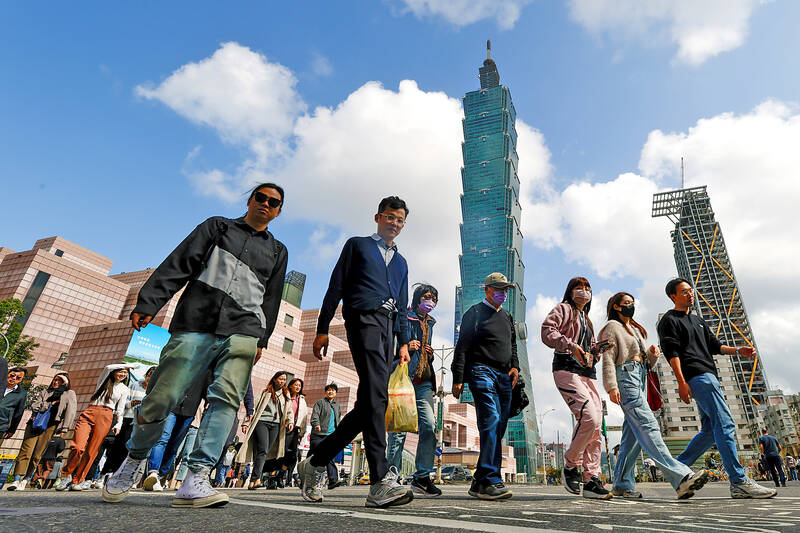The Directorate-General of Budget, Accounting and Statistics (DGBAS) yesterday trimmed its forecast for Taiwan’s GDP growth this year to 3.14 percent from the 3.29 percent it projected in November last year, as budget cuts are expected to curtail government expenditure and potential US tariff hikes raise uncertainty over global trade.
“Taiwan’s exports and private investment would remain robust on the back of expanding global investments in artificial intelligence [AI],” DGBAS Minister Chen Shu-tzu (陳淑姿) said.
The downward revision was also due to a high comparison base last year, when GDP growth was 4.59 percent, higher than 4.27 percent the agency had projected, Chen said.

Photo: Ritchie B. Tongo, EPA-EFE
GDP growth last quarter also fared stronger at 2.9 percent, beating the forecast by 1.06 percentage points, she said.
The high base exacerbates trade protectionism that is clouding the economic landscape internationally, while budget cuts by the legislature would affect government consumption and fixed investment, Chen said.
US President Donald Trump has threatened to impose tariffs of up to 100 percent on semiconductors, unfavorable for Taiwan’s chipmakers, which supply the bulk of the world’s chips.
Global trade is expected to grow 3.2 percent this year, slightly weaker than a 3.4 percent pickup last year, the DGBAS said, citing a report by the IMF.
Exports, a main growth driver for Taiwan, might expand 7.08 percent to US$508.6 billion, slowing from a 9.85 percent gain last year, it said.
However, rising demand for AI applications and high-performance computing would continue to bolster local firms in their supply chains, it said.
Lawmakers removed NT$39 billion (US$1.19 billion) from the central government’s budget for this year and froze an additional NT$63.6 billion, Chen said.
If the freezes remain, GDP growth might have difficulty staying above 3 percent, as the DGBAS would have to drop 0.2 to 0.3 percentage points from its prediction, Chen said.
Nevertheless, a stable labor market with wage increases would allow consumer spending to rise 2.12 percent, the DGBAS said.
At the same time, local semiconductor manufacturers are upgrading their processing technologies and packaging capacities to stay competitive and meet demand, it said.
The trend bodes well for private investment, which might grow 6.18 percent, an improvement of 0.61 percentage points from the previous forecast, the DGBAS said.
The aviation industry would also contribute to private investment, as demand for cross-border travel is rising, it said.
Consumer prices would return to within the central bank’s target range with an annual growth rate of 1.94 percent, the DGBAS added.

A magnitude 7.0 earthquake struck off Yilan at 11:05pm yesterday, the Central Weather Administration (CWA) said. The epicenter was located at sea, about 32.3km east of Yilan County Hall, at a depth of 72.8km, CWA data showed There were no immediate reports of damage. The intensity of the quake, which gauges the actual effect of a seismic event, measured 4 in Yilan County area on Taiwan’s seven-tier intensity scale, the data showed. It measured 4 in other parts of eastern, northern and central Taiwan as well as Tainan, and 3 in Kaohsiung and Pingtung County, and 2 in Lienchiang and Penghu counties and 1

FOREIGN INTERFERENCE: Beijing would likely intensify public opinion warfare in next year’s local elections to prevent Lai from getting re-elected, the ‘Yomiuri Shimbun’ said Internal documents from a Chinese artificial intelligence (AI) company indicated that China has been using the technology to intervene in foreign elections, including propaganda targeting Taiwan’s local elections next year and presidential elections in 2028, a Japanese newspaper reported yesterday. The Institute of National Security of Vanderbilt University obtained nearly 400 pages of documents from GoLaxy, a company with ties to the Chinese government, and found evidence that it had apparently deployed sophisticated, AI-driven propaganda campaigns in Hong Kong and Taiwan to shape public opinion, the Yomiuri Shimbun reported. GoLaxy provides insights, situation analysis and public opinion-shaping technology by conducting network surveillance

‘POLITICAL GAME’: DPP lawmakers said the motion would not meet the legislative threshold needed, and accused the KMT and the TPP of trivializing the Constitution The Legislative Yuan yesterday approved a motion to initiate impeachment proceedings against President William Lai (賴清德), saying he had undermined Taiwan’s constitutional order and democracy. The motion was approved 61-50 by lawmakers from the main opposition Chinese Nationalist Party (KMT) and the smaller Taiwan People’s Party (TPP), who together hold a legislative majority. Under the motion, a roll call vote for impeachment would be held on May 19 next year, after various hearings are held and Lai is given the chance to defend himself. The move came after Lai on Monday last week did not promulgate an amendment passed by the legislature that

AFTERMATH: The Taipei City Government said it received 39 minor incident reports including gas leaks, water leaks and outages, and a damaged traffic signal A magnitude 7.0 earthquake struck off Taiwan’s northeastern coast late on Saturday, producing only two major aftershocks as of yesterday noon, the Central Weather Administration (CWA) said. The limited aftershocks contrast with last year’s major earthquake in Hualien County, as Saturday’s earthquake occurred at a greater depth in a subduction zone. Saturday’s earthquake struck at 11:05pm, with its hypocenter about 32.3km east of Yilan County Hall, at a depth of 72.8km. Shaking was felt in 17 administrative regions north of Tainan and in eastern Taiwan, reaching intensity level 4 on Taiwan’s seven-tier seismic scale, the CWA said. In Hualien, the